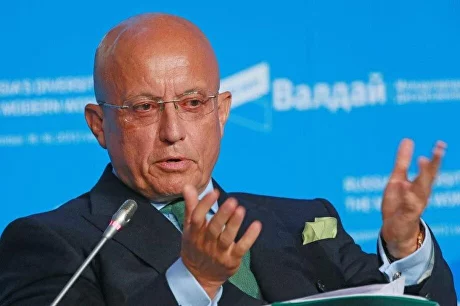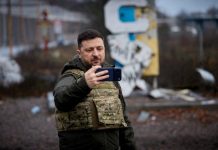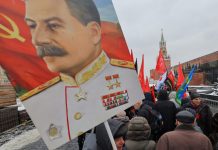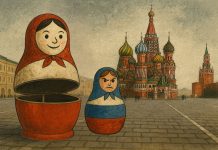By Kseniya Kirillova, for Russia.Post
At the end of May, an annual conference was hosted in Moscow by the Russian Public Opinion Research Center (VTsIOM) on the topic of how Russians are adapting to the “geopolitical changes” – a term that in the Russian information space means the war with Ukraine. In the end, even the sociologists who are loyal to the regime painted a picture of the average Russian as apathetic and above all seeking to maintain a sense of “normality,” which had to be discouraging for the Kremlin.
Sensible apathy
According to sociologist Artemy Vvedensky, there is a fairly large group of Russians (about 30%) who simultaneously support further offensive actions in the war and peace negotiations. In other words, many Russians do not have a clear position regarding the “special military operation.”
A similar view was expressed by other conference participants. Lyudmila Presnyakova, who oversees the financial behavior section at the company inFOM, called apathy and the principle of noninterference “political values” of society. Another speaker, Nikita Savin, agreed with her and offered his own term for the strategy of nonparticipation in politics – a “helix of sensibility.”
The conference participants were far from being the first to try to convince the Russian authorities that the infantilism and apolitical nature of society is good for them. However, the presence of such arguments at a conference hosted by the state sociological service shows that even loyalists admit that patriotic mobilization has failed. The same is evidenced by focus groups conducted by Telegram channels run by the Presidential Administration: the majority of people who outwardly support the “special operation” are not inclined to glorify the soldiers fighting in Ukraine and are not eager to go to the front themselves.
Normalization of abnormal
The ideological inconsistency of people who call themselves “supporters of the special operation” is also highlighted by independent sociologists. According to Svetlana Yerpyleva, a researcher at the Research Center for East European Studies at the University of Bremen, over the past months supporters of the war have not changed their position, though their perception of what is going on has become more “hodgepodge” and conflicted.
Alexei Minyailo, who founded the Chronicles project, also argues that “the majority of Russians (60%) do not even have a minimally consistent position.” Levada Center research head Lev Gudkov notes that, though more than 70% of respondents declare their support for the war in Ukraine, this support is “pure conformity and opportunism.”
In such an environment of strict censorship, it is impossible to separate external from internal conformity, in which a person, wanting to maintain inner peace, seeks to convince himself that the official statements of the authorities correspond to his own position.
It is this internal conformity that sociologists talk about, claiming that Russians, in some sense, “know the truth,” but do not want to admit it to themselves, as they cannot grasp how to live with it. Experts connect this need to push off uncomfortable truth with the aggressive rejection of alternative information, which sometimes even leads to a break with family and friends.
“Unable to deny the very fact of the war, people try to deny Russia’s guilt for what is going on, thereby preserving for themselves the illusion that they live ‘in a normal country’ and thus that their lives remain ‘normal’.”
Because of this psychology, propagandists may not particularly care about the logic of the content they produce – its consumers are happy to be deceived, choosing the rationalization of the war that suits them from the versions offered by propaganda.
One of the versions is focused on justifying the launch of the so-called “special operation.” It was especially visible in the first months after the invasion and was supported by many propaganda narratives, which boiled down to the formula of Russia being forced to launch the “special operation” to avert much more dire consequences. To whip up fear, fakes were used about Ukraine building nuclear weapons, American biological laboratories producing biological weapons, and so on.
While most propagandists tried to adhere to the rhetoric of a “special operation that had to be undertaken” and claimed that “America dragged Russia into the war,” thereby wrecking the existing world order, others said that the destruction of the “Anglo-Saxon world order” is “Russia’s historical mission,” which is why it was necessary for Moscow to start the war anyway. Often, these contradictory statements come from the same people.
For those who may be ashamed by such contradictory justifications, propaganda offers a universal argument: no matter how exactly the war began, Russia now has no other option than to win it, otherwise the country will inevitably be ruined. This narrative, which emerged a couple of months after the start of the war, is the leading one today and perhaps the most effective.
It plays on Russians’ fear of a possible defeat and forces them to rally around the Kremlin while simultaneously allowing them not to think about the objectives or causes of the “special operation.”
Now, a growing number of Russians perceive the war as a kind of natural phenomenon that began spontaneously. When the causes of the conflict fade, it becomes easier for people to take the war for granted. The latest polling by Levada Center shows a rising number of people for whom the war has become a “natural,” familiar backdrop: almost half of Russians believe that the war will last more than a year – that is double the number versus the first months of the war.
In the propaganda stories about the attacks on Ukrainian cities, Russia is practically not mentioned, which also makes it easier to perceive the war as a backdrop and has the benefit of allowing you to triumph over the “enemy” without triggering unpleasant thoughts about responsibility. For example, the Telegram channel of the Ukraina.ru website, which is officially part of the Rossiya Segodnya news agency, daily (and very gleefully) reports on the shelling and bombing of Ukrainian territory in pointedly impersonal language: “Explosions in Kiev,” “Explosions in Kharkiv reported,” “Gerans [drones] active in Khmelnitsky Region,” “Something burning in Lvov,” and so on.
The most important propaganda thesis of the West as the aggressor is perceived especially readily, since the war in that case is defensive and therefore just.

Sergei Karaganov, the Honorary Chair of the Presidium of the Council for Foreign and Defense Policy, said in early June: “We must move to the East. Mentally, economically, politically, because we are stuck in the West, and this is one of our fundamental weaknesses and the causes of our troubles.”
Source: VK
Meanwhile, some propagandists, like retired Foreign Intelligence Service Colonel Andrei Bezrukov, are certain that the “enemy attack” actually took place several decades ago, and since then the country has been under a Western neocolonial yoke. The essence of the “yoke,” according to Bezrukov, is that Russia is obliged to “pay tribute“ in the form of money that Russian elites funnel abroad while plundering the country. The Chair of the Presidium of the Council for Foreign and Defense Policy Sergei Karaganov also speaks about Russia being under the “Western yoke” and believes the current “conflict” makes it possible to finally “throw it off.”
The justification of the war as a “struggle for sovereignty” against neocolonialism is also used by Vladimir Putin, who has said, for example, that “a country can be either sovereign or a colony,” and that without sovereignty “a country has no chance of surviving in the tough geopolitical war.”
Some propagandists elaborate on the reasons for “NATO’s aggression” against Russia, claiming that the US “cannot accept the loss of its hegemonic position.”
To make the war psychologically palatable, some even suggest seeing its positive aspects: for example, arguing that the war helps to “cleanse” Russian society and even that, thanks to the war, bureaucrats have become closer to the people. Putin also talked about “cleansing” in the context of the beneficial effects of the Western sanctions imposed after the start of the war.
Ways people are adapting to the war
It is possible to identify different ways of adapting to war among those who one way or another believed the propaganda or convinced themselves. The already mentioned “sensible apathy” is the most common. According to Levada Center polling, only half of Russians follow developments around Ukraine “closely” or “rather closely.” The lack of major interest may subsequently help people to return to normal life and accept a different interpretation of the causes and objectives of the “special military operation.”
Another way people are adapting is quasi-participation in the war – for example, by writing denunciations against dissenters.
“The informers themselves sometimes admit that their motive is the fear of a potential defeat and the need to pay reparations to Ukraine, which would come at their expense.”
Reprisals against “enemies” who criticize their own government and thereby raise the likelihood of defeat give the informers hope that, thanks to their vigilance, defeat can be avoided.
The conviction that Russia is waging a just war can also motivate some to personally go to the front.
This is partly driven by the deliberate policy of the state to involve “volunteers” and contract soldiers in the war, though, as sociologists note, people’s readiness to fight is also related to the course of the war. Factors include a rising fear of punishment for draft dodging, as well as the events of last month, when the war was brought to Russian territory.
Thus, according to the Levada Center, in May the number of those in favor of continuing the “special operation” rose markedly and for the first time since August last year slightly exceeded the number of those in favor of peace talks (see Levada Center Director Denis Volkov’s piece in Russia.Post).
By Kseniya Kirillova, for Russia.Post





